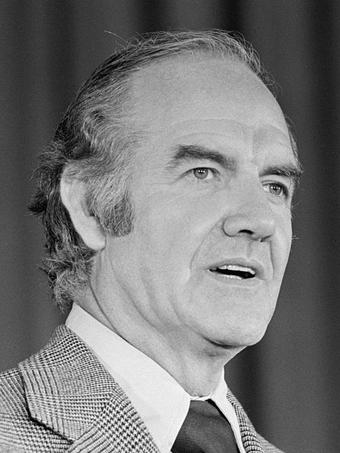George McGovern: Unabashed Liberal and Patriot
By • October 31, 2012 0 1008

George McGovern died Sunday at the age of 90 as the 2012 presidential race rapidly approached its climax. It has been a campaign that has been one of the most contentious campaigns since, well, 1972, when McGovern and his followers took the Democratic Party on a rambunctious, liberally liberal and ultimately disastrous crusade against incumbent President Richard Nixon and the incumbent Vietnam War.
McGovern was an unabashed liberal, and an unabashed patriot, a war hero who bled for the blood of young American men in an unpopular war, a man who led a sometimes stolid, stoic American life coming out of a small-time upbringing on the flat plains of South Dakota to rise to the U.S. Senate for three terms, the pure head of the liberal wing of the Democratic party and his party’s standard bearer in 1972.
The result—a campaign that featured an assassination attempt that knocked Alabama governor George Wallace out of another third-party run, a not-always-hidden dirty tricks campaign by the president’s forces, the demise of centrist Maine Senator Edmund Muskie’s campaign amidst tears in New Hampshire and McGovern, seen as the anti-war heir of the slain Robert F. Kennedy, taking the helm of the party.
That campaign and the man are worth remembering today: his was a life that was marked by decency, sacrifice, the triumphs inevitably accompanied by defeats and tragedies almost as much as the Kennedy clan’s. McGovern’s unrepentant, uncompromising challenge to the nation was to defeat Nixon and end the war. Coming from a man who had flown terrifying bomber missions over Nazi Germany during World War II and was decorated for his heroics. This message should have echoed with great effect throughout the land, but McGovern became the victim of being swept away with the spirit of the party at the time, which, if you listen to commentators of the time, or saw any part of the convention, was an outburst of left-wing, counter-culture ebullience, an in-your-face cultural challenge of rock and roll music, tie dyed t-shirts, afros, beards, mini-skirts, drugs and license which made Middle America shake in its boots.
McGovern’s quite idealistic, resounding, powerfully affecting “Come Home, America” acceptance speech might have made some dent in the final result had it been heard by most of the nation. But with battles and celebrations over all sorts of speeches and issues dragging things out, it wasn’t heard until 2 a.m. As McGovern said then, “Welcome to my sunrise service speech,” an hour when most Americans had indeed gone home.
More trouble followed from the get-go. It was discovered that Missouri Senator Tom Eagleton, his choice for running mate, had electric shock treatments, and was eventually forced from the ticket even after McGovern unwisely had said he backed Eagleton “one-thousand percent.” Few takers for the job could be found, until Sargent Shriver, Kennedy family icon and former head of the Peace Corps, accepted like the good and loyal soldier he had been all of his life.
The Watergate break-in occurred at the time, and while it was being reported, McGovern railed against it, suggesting deeper, darker doings from an unscrupulous Nixon administration. He turned out to be a prophet, a fact which gave him no solace “You know, when somebody says you’re ahead of your time, it just means you have a terrible sense of timing.”
His opposition to the war was honorable, and almost visceral, coming as it did from the experience of war. “I am fed up to the ears with old men dreaming up wars for young men to die in,” McGovern said.
His convictions, his campaign convinced few and ended up in a historic defeat, getting only 38 percent of the nation’s vote—and carrying only Massachusetts and the District of Columbia, losing his own state.
The defeat stung, and lingered, as it might have done with any person in a quest for the most powerful job in the world. In 2008, McGovern was in Washington at the National Press Club participating a panel on the media and elections. A 20-something woman asked him how long it takes getting over losing a presidential election. “I’ll let you know when it happens,” McGovern quipped, 36 years after the 1972 election.
McGovern was not done with suffering—he lost his U.S. Senate seat in the Reagan Republican sea change, and two of his five children died young after battling alcoholism.
Personal tragedy, even of the Shakespearean or Greek kind, does not add up to a legacy, of course; it is a part of the river of life’s stories. McGovern’s legacy remains his steadfast principles, his almost quixotic run against Nixon who himself was forced to resign the presidency, his honest opposition to the Vietnam War and his leadership on fighting world hunger, a passion and cause he shared with Republican Bob Dole, who shared with him a lost presidential campaign and World War II heroism.
President Bill Clinton, who worked on his 1972 campaign in Arkansas, honored him with a Presidential Medal of Freedom in 2000. Sen. John McCain, R-Ariz., called him “always a gentleman and an outstanding member of the greatest generation.”
As a political figure, McGovern was transcendent, with the result that the party, after his devastating defeat started to move more to the center. He was principled—a rare quality today when many politicians, of both parties, seem to have few positions which they are not willing to discard for a sign of movement in the polls. As a man, he never lost touch with the many multitudes and factions that make up our country.
The late journalist Tom Wicker once described McGovern’s antagonist Richard Nixon as “One of Us,” meaning he was the sometimes dark, uncertain face we sometimes saw in the mirror. If that is indeed the case, then George McGovern was the best in us—that which flickers sometimes in our own mirrors.

